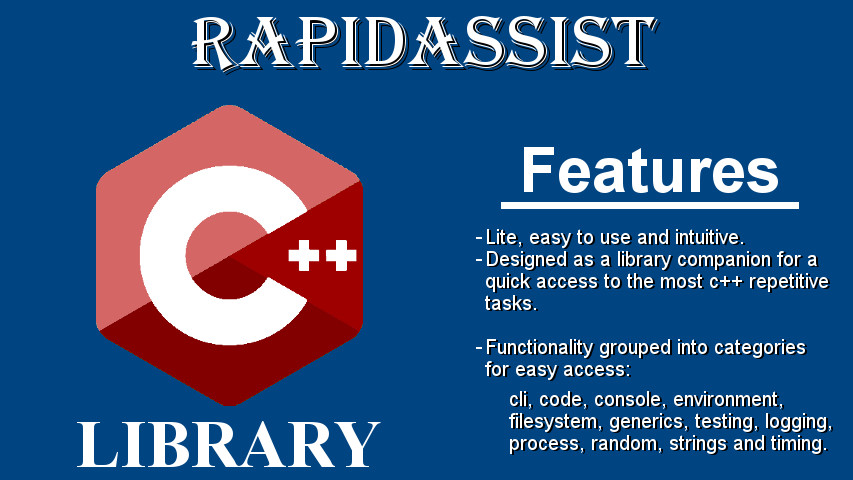RapidAssist is a lite cross-platform library that assist you with the most c++ repetitive task.
Build:
| Service/Platform | Build | Tests |
|---|---|---|
| AppVeyor |  |
 |
| Travis CI |  |
|
| Windows Server 2019 |  |
|
| Ubuntu 20.04 |  |
|
| macOS 10.15 |  |
Statistics:
| AppVeyor | Travic CI | GitHub |
|---|---|---|
Because of the cross-platform nature of the library, the code can get bulky pretty quick (or even messy in some case) because each different operating system has its own quirks and challenges.
The intention of RapidAssist is to be used as a library companion by providing a quick access to the most c++ repetitive tasks. The library aims to be lite, easy to use and intuitive.
To get the code easy to understand, all functions are grouped by category and each category is defined by a namespace which helps increase cohesion between the code of each platform. The namespaces also help reduce coupling between categories.
The categories are cli (command line interface), code, console, environment, filesystem, generics, testing, logging, process, random, strings, timing and unicode.
The library does not intent to replace Boost or other full-featured cross-platform libraries.
The following instructions show how to use the library.
Using the library in other projects is relatively easy as the library supports the find_package() command.
The following section explains how a client executable shall 'find' the RapidAssist library using find_package() command. For the example below, assume one wants to compile the fooexe executable target which have a dependency to the RapidAssist library.
To create a project that have a dependency on RapidAssist, the CMakeLists.txt configuration file should look like this:
find_package(rapidassist 0.4.0 REQUIRED)
add_executable(fooexe <source_files> )
target_link_libraries(fooexe rapidassist)Note that the target_include_directories() command is not required. The fooexe target will automatically have the rapidassist include directories assigned to the project.
In order for the find_package() command to automatically find the library, both RapidAssist and your project must be installed to the same installation directory.
However, on Windows, the CMake default installation directory is C:\Program Files (x86)\${PROJECT_NAME}. This makes the installation directory different for each projects. One must specify the RapidAssist's installation directory manually.
The installation path of RapidAssist can be specified manually by defining the rapidassist_DIR environment variable to RapidAssist installation directory. The rapidassist_DIR environment variable instruct CMake to use this directory while searching. By manually specifying the RapidAssist's install directory, the find_package() command will be able to resolve the path of RapidAssist and locate the include directory and library files.
The following section shows multiple examples of using RapidAssist.
TEST_F(TestDemo, testCodeSample)
{
//create a dummy file based on current gtest name
static const int FILE_SIZE = 1000; //bytes
const std::string path = ra::testing::getTestQualifiedName() + ".tmp"; //returns "TestDemo.testCodeSample.tmp"
ASSERT_TRUE( ra::testing::createFile(path.c_str(), FILE_SIZE) );
//test that a generated file is equals to the expected file
std::string generatedFile = generateTestFile();
std::string expectedFile = getExpectedTestFilePath();
ASSERT_TRUE ( ra::testing::isFileEquals( expectedFile.c_str(), generatedFile.c_str()) );
//split a string into multiple parts
StringVector words = ra::strings::split("The quick brown fox jumps over the lazy dog", " ");
size_t numWords = words.size(); //returns 9
//converting numeric values to string
std::string IntMaxStr = ra::strings::toString(UINT64_MAX); //returns "18446744073709551615"
//execute search and replace in strings
std::string whoiam = "My name is Antoine and I am a superhero.";
int numReplaced = ra::strings::replace(whoiam, "hero", "vilan"); //returns 1
}Please refer to file INSTALL.md for details on how installing/building the application.
RapidAssist has been tested with the following platform:
- Linux, 32 and 64 bit
- Windows, 32 and 64 bit
- macOS, 32 and 64 bit
We use Semantic Versioning 2.0.0 for versioning. For the versions available, see the tags on this repository.
- Antoine Beauchamp - Initial work - end2endzone
See also the list of contributors who participated in this project.
This project is licensed under the MIT License - see the LICENSE file for details


